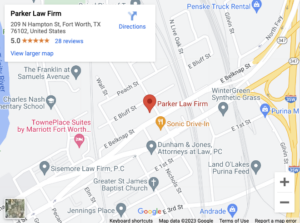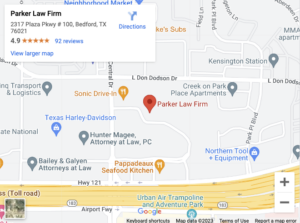Negotiating Medical Liens in Personal Injury Settlements: A Practical Guide

If you’ve been injured because someone else wasn’t careful, the road to justice can feel long and exhausting. You’ve faced pain, doctor visits, and the stress of a personal injury claim. When you finally hear that your case has settled, it’s natural to feel a sense of relief. But then a new worry pops up: How much of this settlement will actually end up in your pocket?
This is the moment you discover that the first battle may be over, but a second one is just beginning. This is the fight to protect your hard-won settlement from a host of faceless adversaries you may have never considered: medical providers, health insurers, and government agencies, all lining up to claim a piece of your recovery. This is the battle over medical liens, and it is often the most critical phase in determining the true value of your victory. At Parker Law Firm, we understand this reality better than anyone. We understand that a settlement is merely a numerical value on paper. The only result that truly matters is the money that goes into your pocket, and we fight to protect every last dollar of it for you. This isn’t just about closing a case; it’s about standing as vigilant guardians over your future, ensuring your final victory is a meaningful one.
Understanding Medical Liens, Subrogation, ERISA, and Medicare
Once you’ve dealt with the at-fault party and their insurance company, you probably don’t want to face more challenges. Still, it’s important to know what can reduce your settlement. These claims come in various forms, each with its own set of rules. Handling them takes legal skill and a strong focus on your financial interests. We want you to understand what we’re working to protect.
What is a medical lien?
In the simplest terms, a medical lien is a legal right held by a healthcare provider or insurer to be reimbursed for the medical costs they covered related to your injury. Think of it as an IOU that gets attached to your settlement funds. When a doctor’s office, hospital, or even your own health insurance plan pays for your treatment, they aren’t doing so out of pure generosity if a third party was at fault. They are extending you credit, with the full expectation of being paid back once you recover money from the person who caused your harm. This legal claim ensures they get paid before you do. The total value of these liens can be staggering, sometimes even exceeding the settlement amount itself, making their negotiation a crucial factor in your final take-home recovery.
Subrogation basics
You will often hear the term “subrogation” used in conjunction with medical liens. Although they are related, they are not identical. Subrogation is the legal right of an insurance company to step into your shoes and pursue the at-fault party to recover the money it paid out for your medical care. More commonly, however, they will assert this right against your settlement. It is their way of saying, “We covered these bills for our member, and now that you’ve received compensation for those same bills, we are entitled to be paid back.” This applies to your own health insurance and, in some cases, your auto insurance if it includes coverage for medical expenses. These subrogation interests are another claim on your settlement that must be resolved, and they represent another front in the battle to protect your net recovery.
ERISA liens explained
Not all health insurance plans work the same way, especially when it comes to liens. If your insurance comes from a private employer, it’s probably covered by a federal law called ERISA. These plans are tough—they often want every penny back and don’t have to follow some state laws that protect you. Trying to handle an ERISA lien on your own is like stepping into the ring with a heavyweight. You need someone who knows the rules and isn’t afraid to push back for a fair deal.
Medicare conditional payments
If you are a Medicare beneficiary, the federal government also has the right to be reimbursed from your settlement. When Medicare pays for medical treatment related to your injury, those payments are considered “conditional.” They are made on the condition that Medicare will be paid back if and when you receive a settlement or judgment. These are often referred to as “super liens” because Medicare’s right to recovery is incredibly strong and backed by federal law. Failing to properly resolve a Medicare lien can have severe consequences, including the government seeking double damages. However, even these formidable liens are not set in stone. A skilled attorney can audit the charges to ensure they are all related to the accident and negotiate with the agency to reduce the final amount, protecting both your settlement and your future Medicare benefits.
State-Specific Lien Laws and Caps
The battlefield for negotiating medical liens varies from one location to another. The rules of engagement are heavily influenced by state law, resulting in a complex and varied legal landscape. This is why having an attorney who is not only an expert in personal injury law but also deeply familiar with the specific statutes in your state is absolutely critical. These laws can provide powerful tools for protecting your settlement, but only if you know they exist and how to use them effectively.
State-specific laws affecting medical liens
Every state has its own set of statutes governing the handling of medical liens and subrogation interests. These laws can dictate who is allowed to place a lien on a settlement, how that lien must be formalized, and what percentage of a settlement can be claimed. For example, some states have specific laws that apply only to hospitals, while others have broader regulations that cover all healthcare providers. This patchwork of rules underscores the importance of local expertise. An attorney in North Carolina will use a different set of arguments and legal precedents than one in California. Understanding these nuances is crucial for developing effective legal strategies to reduce medical liens after settlement. An out-of-state lawyer, or one who doesn’t focus on personal injury, might miss a crucial protection afforded by local law, leaving your money on the table.
Statutory caps on medical liens by state
Fortunately, many states have recognized the potential injustice of medical bills consuming an entire settlement and have enacted laws to prevent this from happening. These statutory caps impose a legal limit on the amount that lienholders can recover. In North Carolina, for instance, the law provides a clear formula: after attorney’s fees are deducted, all medical providers combined cannot claim more than 50% of the remaining settlement balance. California has a similar provision limiting hospital liens to no more than 50% of the net settlement. Here in Texas, our Property Code includes a hospital lien statute that grants hospitals a direct claim on personal injury recoveries, while also outlining specific procedures they must follow. These caps are not automatic discounts; they are legal shields that must be affirmatively used by your advocate as a powerful starting point in negotiations to ensure you receive a fair portion of your recovery.
Pro rata share rule by state
Another important rule that varies by state is the “pro rata share” rule. This rule applies when your settlement isn’t enough to cover all your damages, like medical bills, lost wages, and pain and suffering. It states that if you aren’t fully compensated for your losses, the lienholder shouldn’t be either. For example, if your damages are $200,000 but you settle for $100,000, the lienholder should only get 50% of their claim. This rule helps make sure the loss is shared fairly. Using the pro rata share rule requires careful calculation of your total damages, which experienced personal injury lawyers are well-equipped to do.
Negotiation Strategies to Reduce Liens
Knowing the rules is just the start. Winning the fight to reduce medical liens takes skill, experience, and determination. It’s not just about asking for a discount—it’s about showing why the lienholder should take less. This is where having the right legal team makes a real difference. We work to reduce a large debt to a fair amount, so you retain as much of your settlement as possible.
Steps to negotiate ERISA liens in personal injury cases
ERISA liens are tough. Insurance companies managing these plans often decline any reduction, citing federal law. But that’s just their first move. The real work begins by obtaining the full plan documents, not just a summary. We go through every page, looking for anything that limits what they can claim. We argue they can’t take money meant for pain and suffering, only for medical bills. We also utilize legal tools, such as the common fund doctrine, to advocate for a lower amount. Step by step, we work to secure a fair deal for you.
Reducing healthcare provider liens in Texas
For hospitals and doctors in Texas, we become involved early and take action promptly. We don’t wait until the settlement check arrives to begin discussing the details. From the start, we contact billing departments and review every charge, challenging any inflated bills. We use our relationships with local providers to negotiate better rates. We also explain your financial situation and the limits of the insurance, showing that accepting a partial payment now is better for them than waiting and risking a smaller amount later.
Common fund doctrine in medical lien settlements
The common fund doctrine is a powerful legal principle rooted in the principle of fundamental fairness. The logic is simple: the lienholder, be it a hospital or an insurance company, did not have to hire an attorney, file a lawsuit, or spend years fighting to create the settlement fund from which they expect to be paid. We did that work on your behalf. The common fund doctrine allows us to argue that, since the lienholder benefits from our legal efforts, they must share in the cost of those efforts. This typically means reducing their lien by a percentage equal to our attorney’s fees and a share of the case expenses. It is a cornerstone of our negotiation strategy, ensuring that these entities don’t get a free ride on the back of your struggle and our hard work.
How to challenge unrelated charges in medical liens
It’s surprising how often lien claims include charges that have nothing to do with your accident. Billing mistakes are common, and sometimes charges for old conditions or routine visits are added by accident. That’s why we always review every bill carefully. We check all your medical records to make sure each charge is related to your injury. By identifying and disputing these unrelated charges, we can often reduce the total amount before negotiations even begin. This careful review is part of our commitment to protect your recovery.
Case Studies and Real-Life Examples
Theories and strategies are important, but the true measure of an attorney’s value is in the results they achieve for their clients. The difference between a hollow victory and a meaningful recovery often hinges on the skill and dedication applied during lien negotiations. These real-world examples illustrate not only the immense financial stakes but also the systemic disadvantages faced by those who try to navigate this complex process alone. They are a powerful testament to why having a vigilant guardian in your corner is not a luxury but a necessity.
Case study: lien reductions through negotiation
One client’s story shows our approach. She was in a serious accident and got a settlement offer of $100,000, but her medical bills and liens were over $150,000. If she had accepted the settlement on her own, all the money would have gone to pay those bills, leaving her with nothing for her pain, lost wages, or future needs. We stepped in and reviewed every bill, utilizing state law protections and arguing financial hardship. In the end, we negotiated the claims down so that after all liens and our fees, she received $50,000. This shows that what matters most is your net recovery, not just the initial settlement amount.
State-law impacts on lien negotiation outcomes
The system is not designed for individuals to navigate independently, and the consequences of being unrepresented can be severe and financially devastating. This was laid bare in a large class-action settlement. In an effort to ensure fairness among all claimants, the court made a startling decision. The awards for any unrepresented claimants, those who did not have an attorney fighting on their behalf, were proactively reduced by 33.3%. The court’s reasoning was that the represented claimants had to pay their attorneys for securing the recovery, so to create equity, the unrepresented members had to take a similar reduction. This is a stark, undeniable warning: the legal system itself often operates with the built-in assumption that you have a professional advocate. Without a guardian fighting on your behalf, you are not on a level playing field. You are starting from a position of disadvantage, and you may end up with a fraction of the compensation you truly deserve, even when you are part of a group victory.
Practical Preparation for Lien Negotiations
The process of resolving medical liens can feel opaque and frustrating, often marked by long periods of waiting followed by bursts of complex activity. While our firm takes on the full burden of this fight, we believe in keeping our clients informed and empowered. Understanding the key components of this process can help demystify the experience and provide reassurance that your case is being handled with the meticulous attention it deserves. It’s a process that requires patience, but that patience is rewarded when it results in a significantly larger net recovery.
Documentation checklist
To effectively challenge and negotiate a lien, we must first build our arsenal. This involves gathering a comprehensive collection of documents that allow us to understand the full picture and identify any weaknesses in the lienholder’s claim. We meticulously assemble a file containing every itemized medical bill, not just the summary statements. We collect all Explanation of Benefits (EOB) forms from your insurance company to see what was billed versus what was actually paid. We obtain copies of the full insurance policy or ERISA plan documents, as the specific language within them is critical. All correspondence from providers and insurers is logged and saved. This thorough documentation allows us to leave no stone unturned as we prepare to deconstruct their claims and fight for the maximum possible reduction on your behalf.
Timeline and process
One of the most common sources of anxiety for clients is the delay between reaching a settlement and actually receiving their funds. We want to be direct and honest about this: lien negotiation takes time. It is not an overnight process. Once a settlement is reached, the funds are placed in a trust account. We then must formally notify every potential lienholder and request their final lien amount. This alone can take weeks or even months. Once we have their claims, the real work of auditing and negotiating begins. This involves phone calls, letters, and legal arguments, often with multiple rounds of back-and-forth. While we strive to resolve these claims as quickly as possible, we will never compromise your financial outcome for the sake of speed. We provide our clients with regular updates throughout this period, ensuring you are always informed. This allows you to focus on your recovery, confident that we are diligently managing this crucial final step.
Frequently asked questions (FAQ)
Over our 35 years of fighting for the injured, we’ve heard every question imaginable about this process. Clients often ask us, “How can I negotiate a medical lien reduction on my own?” While it’s theoretically possible, it’s akin to trying to perform surgery on yourself; you lack the necessary tools, training, and objective perspective to succeed. Others wonder, “What are the legal implications of these liens?” The implications are immense; failing to properly resolve them can expose you to lawsuits from providers and can jeopardize your future health benefits. Many people ask if there are state-specific laws that can help, and as we’ve discussed, the answer is a resounding yes, but these laws are complex. Finally, clients want to know what strategies we use to dispute a lien. Our approach is multifaceted: we verify every single charge, challenge anything unrelated or inflated, leverage legal principles such as the common fund doctrine, and never stop fighting until we’ve secured the best possible result for you.
Your case is important to us. We know it’s about your life and your future. When we take your case, we promise that you will keep more money than you pay in attorney’s fees. We keep this promise in mind, especially when negotiating liens. The real victory is not just the settlement amount, but the financial security and peace of mind you get from having someone fight for you.
If you are recovering from an injury and facing a mountain of medical bills, you don’t have to face this second battle alone. Contact Parker Law Firm today for a confidential case review. We’re here to listen, to understand, and to stand as the vigilant guardians of your final victory. Let us fight for you.


